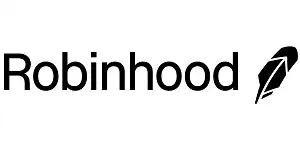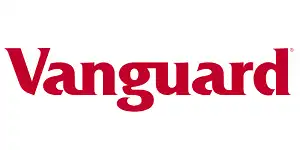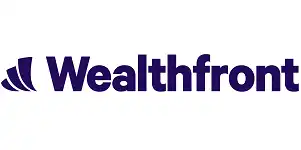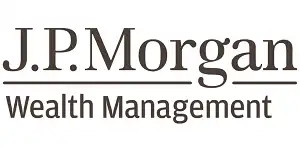Where you hold your investments matters less than what kinds of investments you buy. But among hundreds of account options available to U.S. investors, a few stand out to me.
By no means is this an exhaustive list of investing platforms…I mean, you can invest using Cash App now! I recommend these accounts for their ease-of-use, low fees and most importantly, their reputation. Some companies are affiliates, denoted by a 💰 emoji. If you do wish to open an account with one of my affiliates and use my link, I am forever grateful 🙏🏻.
The best investment accounts
Brokers for DIY investing/trading:
Robo-advisors for guided investing:
Also good for Chase banking customers:
*I personally have investment accounts with these companies.
If you’re unsure what type of investment account you should open, read more about investment account types below.
Robinhood
You’ve likely heard of Robinhood 💰, and the mobile-friendly stock trading app is a solid choice. Robinhood is supremely easy to use, rich with beginner-friendly features, and requires just $1 to get started investing. If you want to try your hand at trading stocks or simply want an investment account with a slick, game-like UX, Robinhood is it.
Robinhood is a popular stock trading and investing app that offers zero-commission trades on thousands of investments, including stocks, starting with as little as $1.
With beginner-friendly features and easy-to-read charts, Robinhood is great for new investors and there's advanced features even more seasoned investors can appreciate.
- Commission-free trading
- Easy to use, well-displayed dashboard
- No obligation or minimum account balance
- No bonds or mutual funds
- Crypto fees can be more transparent
Here are some fast facts about Robinhood:
- Account minimum: $0, $2k for Robinhood Gold (margin, more data)
- Trade/account management fees: None
- Investment options: Stocks, ETFs, options, cryptocurrency
When the Robinhood investing app launched, it changed the investing world with its commission free trades; allowing investors to purchase investments fee-free. (Until recently, most brokers charged a commission of around $5 each and every time you wanted to buy or sell a stock or ETF). Now, virtually all investment accounts have dropped such trading commissions. But we have Robinhood to thank.
One of the best things about Robinhood for new investors is the ability to buy fractional shares of stock. Traditionally if you wanted to buy a share of, say, Microsoft, when it’s trading at $320, you’d have to pay $320 for one whole share. But with Robinhood, you can simply say “I want $50 worth of Microsoft” and Robinhood will carve a slice for you.
Despite being known as “the platform for stock market newbies,” Robinhood provides some pretty advanced features like margin trading, options, and access to some cryptocurrencies. Although we don’t necessarily recommend new investors use these features, which can lead to big losses for the inexperienced, it’s nice to know that a Robinhood account is not simply a set of “training wheels” for new investors.
» MORE: Open an account with Robinhood 💰 or read my Robinhood review
Fidelity
We’ve previously called Fidelity “the most comprehensive of interactive brokers out there.” You’ll get a bonafide cornucopia of account types, investment choices, human or robo-advisor management of your portfolio, educational resources, analytics, and more.
- Minimum investment: $0
- Trade/account fees: None for trades, none for Fidelity Go accounts with balances <$10k, $3/month for between $10k-$50k, 0.35% annually for balances larger than $50k
- Investment options: Stocks, bonds, ETFs, actively managed funds, CDs, options, precious metals, money market funds
While perhaps intimidating to newcomers, Fidelity’s vast and expansive toolkit combined with low fees make it the perfect playground for aspiring or experienced day traders. It’s worth noting, too, that Fidelity has been around since 1946 and now has $4.5 trillion in assets under management.
Why does that matter to day traders? Because newer, less experienced brokerages can sometimes buckle under intense trading volume. Day traders on a robust platform like Fidelity are less likely to experience such issues when it matters most.
» MORE: Read our full Fidelity review
Vanguard
Vanguard is the world’s largest mutual fund company and responsible for making low-cost index funds as prevalent as they are today. Vanguard’s founder, John Bogle, believed in keeping investment costs as low as possible so investors could keep more of their returns. Although Vanguard offers full-service brokerage capabilities, I only use them for holding index ETFs long-term.
- Minimum investment: $3,000 for most mutual funds; $1,000 for target-date funds
- Trade/account fees: Commission-free stock trades. $25 annual fee per account; waived for customers with more than $5 million in assets with Vanguard.
- Investment options: Mutual funds, ETFs, stocks, bonds, money market funds, CDs.
I love Vanguard’s commitment to low-cost investing and value their unparalleled global reputation — in other words, I sleep well at night knowing my money’s with Vanguard. But among all the accounts on this list, Vanguard is better suited for affluent investors. Due to their sheer size, Vanguard isn’t shy about indicating a preference for wealthier clients. (See the fact that it takes $5 million in assets to waive their $25 annual fee!) Vanguard has tiers of client benefits that provide increasing levels of service the more money you invest.
Vanguard Digital Advisor
Vanguard Digital Advisor 💰 is the robo-advisor offering from Vanguard. If you want a “set it and forget it” approach to investing and have at least $3,000 to invest, Vanguard should be on your list.
Vanguard Digital Advisor is a low-cost robo-advisor offered by Vanguard, the world's largest provider of mutual funds.
Vanguard Digital Advisor combines Vanguard's famous low-cost index funds with personalized strategies and advice for your unique investing goals.
- Vanguard's unmatched reputation
- Advisory fees as low as 0.20%
- ESG option
- Not for active traders or stock pickers
- $3,000 account opening minimum
Importantly, you do not need to enroll with Vanguard Digital Advisor to invest with Vanguard. You can also open a self-directed Vanguard brokerage account to invest on your own. This is a good option for anyone who wants to build their own portfolio of index funds to invest for the long-run. If you’re looking to frequently trade funds and individual stocks, I would go elsewhere.
» Learn more in our Vanguard Digital Advisor Review
Wealthfront
Wealthfront 💰, which is now owned by Swiss financial giant UBS, is another best investment account for beginners because of its low account fees, clever automation, and because it only requires $500 to start. They also offer an attractive cash management bank account where your uninvested cash can earn a 5.00% APY.
Wealthfront is designed for young professionals, anyone from passive investors who want expert digital guidance, to people who want to be smarter with money.
With low fees and multiple tax perks, automated investment management tuned in to your individual risk level make Wealthfront worth a look.
- Passive investing with automated management
- Tax-loss harvesting
- Ability to customize portfolios
- No fractional shares of ETFs in automated accounts
- No human advisors
Wealthfront is a managed investment account (also known as a robo-advisor). Robo-advisors work differently than stock brokerage accounts. We recommend these kinds of investment accounts for new investors because you don’t need to know anything about investing to get started and allow you to invest in a widely diversified portfolio of stocks and bonds. This strategy, known as passive investing, provides the highest, most consistent returns over the long-run and is much less risky than trying to pick individual stocks.
Here are some quick things to know about Wealthfront:
- Account minimum: $500
- Trade/account management fees: 0.25% annual account management fee
- Investment options: Pre-built portfolios of exchange-traded funds
- Offers retirement accounts (IRAs): Yes
Wealthfront also allows for a fair degree of customization as you become more comfortable with investing. You can add or remove vetted ETFs to and from your portfolio as you wish. You can also choose from categories like technology ETFs, healthcare ETFs, cannabis ETFs, and more.
It can also help you build an entirely ESG (environmental, social, governance) portfolio from scratch so you can rest well knowing your investments are benefiting the world.
Lastly, Wealthfront lets you dabble in crypto, albeit indirectly. You can allocate up to 10% of your portfolio to two different crypto trusts, Grayscale Bitcoin Trust (GBTC) and Grayscale Ethereum Trust (ETHE). You should know, however, that investing in a crypto trust can be just as risky as crypto itself — so be sure to read our complete guide to investing in cryptocurrency first.
» MORE: Open an account with Wealthfront 💰 or read our Wealthfront review
J.P. Morgan Self-Directed Investing
J. P. Morgan Self-Directed Investing 💰 is a solid pick for existing Chase customers. It’s a good fit for them because you can log into Chase, open a new brokerage account in just a few clicks, and voila — your Self-Directed Investing account will live on your Chase dashboard forever, conveniently wedged between checking/savings accounts and instantly accessible. You can also move money between your other Chase accounts and your SDI account in a single click. The more Chase products you use, the better benefits you get from Chase, and account balances with J.P. Morgan Self-Directed Investing will help you meet eligibility requirements for Chase’s best checking accounts and borrowing rates.
J.P. Morgan Self-Directed Investing offers Chase clients tremendous convenience and new investors an intuitive investing platform with unlimited commission-free online stock, ETF and options trades.
It's ideal for those who are interested in learning the market with no investment minimums attached.
- Exceptional customer support
- Simple, intuitive interface
- Easy integration for existing Chase customers
- Advanced traders may want additional functionality
- Portfolio Builder requires $2,500 min.
- Account minimum: $0
- Trade/account management fees: None
- Investment options: Stocks, options, ETFs, bonds, mutual funds
It’s worth mentioning that you can also open an Automated Investing account with Portfolio Builder with a minimum $500 investment.
» MORE: Open a J.P. Morgan Self-Directed Investing account 💰 or read our J.P. Morgan Self-Direct Investing review
Types of investment accounts
Before opening an investment account, it’s important to understand the most common types of investment accounts and to choose the right one.
Self-directed brokerage account: With a self-directed account, you buy and sell your own investments — typically either individual stocks or exchange-traded funds (ETFs). A self-directed account gives you the ultimate flexibility to trade as often or as infrequently as you like.
Robo-advisor account: A robo-advisor account automates the choosing, buying and selling of investments. After answering a few questions about your goals and risk tolerance, a robo-advisor invests your money appropriately. Robo-advisors are an affordable, hands-off approach to long-term investing.
Managed investment account: With a managed investment account, a financial advisor manages your investments for you. It’s more expensive than a robo-advisor, but worth it for investors who want a personal touch and “to have someone to call” with questions or changes. Learn more about finding a great financial advisor.
IRA. An IRA, or individual retirement arrangement, is a type of investment account designed for saving for retirement. When invested, money in an IRA grows tax-free. With a “traditional” IRA, contributions are pre-tax, but you must pay taxes on all withdrawals. With a “Roth” IRA, contributions are post-tax, but you do not pay federal income tax on principal or growth when you withdraw money in retirement. An IRA can be a self-directed, robo-advisor or managed investment account.
401(k). A 401(k) is a retirement-savings account that’s administered by your employer. You enroll for a 401(k) at work and investment contributions will be automatically deducted from your paycheck. Some employers will also match a certain percentage of your contributions as a benefit.
FAQs
What is a taxable investing account, aka brokerage account?
A brokerage account is simply a basic account used to buy and sell securities like stocks, bonds, ETFs, etc. By default, we’re referring to a taxable brokerage account — meaning you’ll owe capital gains taxes on your profits and income tax on dividends and interest. Compare this to a traditional individual retirement account (IRA), which offers tax advantages because you don’t have to pay any taxes on profits or dividends.
What is a robo-advisor, and is it better than a human financial advisor?
Robo-advisors are AI algorithms that help pick your investments for you, typically based on questions about your goals and risk tolerance. Human advisors do the same and charge more (1% compared to 0.25%), but can help guide you and find your goals in the first place. Both have value; there’s no wrong choice.
How much money should I be investing at my age?
A good starting point is 20% of your income. Don’t be afraid to start small —$100 invested at age 25 with 8% APY will become $1,478.53 by age 60.
Should I be choosing my own investments?
If you’re new to investing, it’s best to let your robo- or human advisor do most of the choosing for you. If you’re eager to get hands-on, start with a small slice of your overall portfolio — maybe 5% — to hedge your risk.
What’s the best brokerage account to trade stocks?
The best brokerage account to trade stocks depends on whether you’re going to be a frequent trader or, like most investors, want the option to occasionally buy and sell stocks via mobile app. We stand by our top pick for brokerage account, Robinhood, if you want the ability to trade stocks via mobile app but not the advanced features of some larger brokerage firms.
Why do investment companies have account minimums?
Many trading platforms do have account minimums because it’s just not profitable to offer financial services on very small accounts. That’s one of the things that makes our picks for best trading platforms stand out — most are great for beginning investors because they have no (or very small) account minimums.
What is a mutual fund?
Mutual funds are a type of investment that combines hundreds of stocks, bonds or other investments into a single fund. Although mutual funds remain a good investment choice for long-term, buy-and-hold investors, over the past two decades, exchange-traded funds (ETFs) have become increasingly more popular.
Mutual funds and ETFs are similar: Both are funds containing many different investments to provide a desired mix of asset classes. The difference is how they are bought and sold. ETF trades work just like a stock; you can buy or sell them any time the stock market is open. Mutual funds are priced once a day and typically take a few days to trade.
A mutual fund can be an index fund or an actively managed fund. With an actively managed mutual fund, a professional investment manager picks stocks and makes trades in an attempt to maximize investment performance.
Vanguard Digital Advisor disclosure
Vanguard Digital Advisor is an all-digital service. Digital Advisor’s annual net advisory fee is approximately 0.15% across your enrolled accounts for a typical investment portfolio, although your actual net fee will vary depending on the specific holdings in each enrolled account. Vanguard Digital Advisor charges a 0.20% annual gross advisory fee to manage Vanguard Brokerage Accounts. However, we’ll credit you for the revenues that The Vanguard Group, Inc. (“VGI”), or its affiliates receive from the securities in your Digital Advisor managed portfolio (i.e., at least that portion of the expense ratios of the Vanguard funds held in your portfolio that VGI or its affiliates receive). Your net advisory fee can also vary by enrolled account type. The combined annual cost of Vanguard Digital Advisor’s annual net advisory fee plus the expense ratios charged by the Vanguard funds in your managed portfolio will be 0.20% for Vanguard Brokerage Accounts. For more information, please review Form CRS and the Vanguard Digital Advisor brochure.
Enrollments in Vanguard Digital Advisor require at least $3,000 in each Vanguard Brokerage Account. For each taxable account or traditional, Roth, or rollover IRA you wish to enroll, the entire balance must be in certain allowable investment types (based on eligibility screening by Digital Advisor at the time of enrollment) and/or the brokerage account’s settlement fund. We’ll [typically] invest your assets in a portfolio of Vanguard ETFs®, all of which are commission-free through a Vanguard Brokerage Account. Vanguard Brokerage Accounts are offered through and maintained by Vanguard Marketing Corporation (“VMC”), a registered broker-dealer and member FINRA and SIPC. If you decide to manage your investments on your own, you can buy and sell Vanguard ETF Shares through Vanguard Brokerage Services® or another broker (which may charge commissions).
Vanguard Digital Advisor’s services are provided by Vanguard Advisers, Inc. (“VAI”), a federally registered investment advisor. VAI is a subsidiary of VGI and an affiliate of VMC. Neither VAI, Digital Advisor, VGI, nor VMC guarantees profits or protection from losses.



